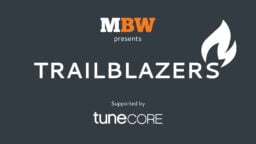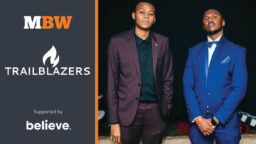Trailblazers is an MBW interview series that turns the spotlight on music entrepreneurs with the potential to become the global business power players of tomorrow. This time, we speak to artist and producer, Russ. Trailblazers is supported by TuneCore.
As the name of this series suggests, and explains in the opener above, MBW’s Trailblazers turns the spotlight on some of the contemporary music industry’s most interesting entrepreneurs.
For the final installment of 2023, we caught up with Russ, an independent artist who has been challenging the power dynamic of the music business for more than a decade.
Russ (Russell Vitale) is a rapper, singer, songwriter, producer, record label owner and best-selling author who achieved significant success independently before signing a deal with Columbia Records in late 2016, releasing his major label debut, There’s Really a Wolf, in May 2017.
His career has been one defined by DIY ethics – writing, producing and engineering There’s Really a Wolf himself – and releasing a vast volume of self-produced work prior to achieving wider mainstream attention following the release of that album.
Russ points to his ‘do it yourself’ approach and high creative output on the track, I’m Here, from There’s Really a Wolf, in which he proclaims: “Singin’, rappin’, mixin’ masterin’, engineerin’ producin’/That’s every song with no exception, plus the catalog longer than a lot of veterans.”
He released 11 mixtapes independently between 2011 and 2014 and a song a week on SoundCloud for “two and a half years straight” prior to signing with Columbia.
Russ arguably transitioned from being a successful DIY musician to a self-sufficient one-man hit factory in the lead-up to his major label debut with There’s Really a Wolf, which reached No.7 on the US album chart, and featured two US Top 100 hits; What They Want and Losin Control.
Those two tracks have since been streamed over 530 million times and 670 million times respectively, on Spotify alone.
“I was still making hundreds of thousands of dollars a month from TuneCore while being partnered with a major.”
Russ
Russ was already generating significant revenues as an independent artist prior to signing a record deal and says he was still “making hundreds of thousands of dollars a month” from his (pre-Columbia) back catalog via TuneCore while in partnership with the label.
In June 2020, Russ published TuneCore income statements to Instagram “for inspirational purposes” showing his monthly earnings from his music between 2013 and 2017.
His revenues are reported in those statements as $48.66 for the month of August 2013, rising to well over $100,000 on average per month from June 2016 until October 2017 when, during that month, his statement shows that he earned over $280,000.
He’s described by Believe-owned TuneCore as one of the distribution platform’s “biggest success stories”.
Asked why he decided to sign a record deal when he was already making a healthy living from his music via a DIY distro service, Russ explains that the reasoning behind signing a deal was strategic. “The music business had a different landscape back then,” he says.
“Playlisting and streaming in general was all pretty new and not much of a talking point. Apple Music didn’t come out until 2015.
“I was still focused on getting on the radio and at that time everyone on radio was signed, so I said, ‘Ok lemme level the playing field and partner with a major so I can get on the radio’.”
Russ’s partnership with Columbia Records continued for two more albums following the release of There’s Really a Wolf, with Zoo (2018) and Shake the Snow Globe (2020) both hitting No.4 on the US album chart, respectively. In June 2020 he announced via Instagram that he was “100% independent” again.
Russ has released multiple projects independently since the end of his partnership with Columbia in 2020, including the Chomp EP in 2020 (released via TuneCore) featuring high-profile guests from DJ Premier to Busta Rhymes.
The Chomp 2 album followed in 2021 (released via gamma-owned Vydia), and again featured various superstar guests including Snoop Dogg, Big Sean, Ghostface Killah and more.
Most recently he released the Chomp 2.5 EP in May 2023 via his own DIEMON Records which he launched alongside his long-time collaborator Bugus in 2022 and is distributed via Vydia. Russ released his latest LP, Santiago, (DIEMON, distributed by Vydia) in August 2023.
Russ runs his day-to-day business alongside long-time manager Milan Ackerman, who discovered the superstar rapper’s music on SoundCloud back in 2014.
“We bring on our PR, digital marketing and creative agencies to help assist when need be,” explains Russ of their day-to-day operations.
“Other than that it’s just me dropping songs and letting the fans do what they do.”
Here, Russ talks about independence, record deals, advice for aspiring artists and music entrepreneurs, and more…
Looking back at the start of your professional music career, to what do you owe your early success as an independent artist and entrepreneur?
Belief in myself and not falling for the “one size fits all” path of the music business. I believed I could do things my own way.
How was your columbia deal structured and what was your experience like of working with a major music company?
It was a profit split deal, which at that time was very rare,, especially for a new artist. It was only three albums and I owned my masters and get full 100% profit back in a couple years [from] now.
I had complete creative control and was able to retain full ownership of my back catalog on TuneCore so I was still making hundreds of thousands of dollars a month from TuneCore while being partnered with a major.
“I’m glad I partnered [with a major label] because when I speak on independence I’m not speaking from a place of ignorance.”
After the second album I realized that the label wasn’t doing anything that I couldn’t do for myself so that’s why I left. Labels can’t guarantee radio play or playlisting, so it just didn’t make sense to stay once I realized that.
I’m glad I partnered though because when I speak on independence I’m not speaking from a place of ignorance. I’ve done the major label thing at a very high level so I can speak on that system confidently from real-life experience.
I think it validates my point of view on independence because I’ve actually seen the other way too.
What is your view today about the value for an artist of any genre signing with a record company versus pursuing other options for distribution and monetization of their music?
I think artists just have to be honest with themselves. If you don’t have the entrepreneurial spirit and you just wanna show up and sing and let everyone else do the rest, you probably should [sign] with a label.
“Being independent takes a lot of work and all the responsibilities fall on your shoulders.”
Being independent takes a lot of work and all the responsibilities fall on your shoulders. If that’s not for you, then [sign] with a label but understand the tradeoff. If you want someone to invest millions into you and do all the work outside the studio, chances are you’re not gonna get a favorable deal.
What are your predictions for the power dynamic between the established record business and the independent artist sector in years to come?
People want big bags of money immediately and lack foresight so labels will always exist, I think. But I think more and more artists are going to use labels and then leave, similar to what I did. The juice just isn’t worth the squeeze at a certain point.
In 2020 you announced that you were 100% independent again. Could you talk about that transition from working with a major to operating independently and what it meant for your artist business?
It didn’t change much to be honest. I was still the driving force behind the success of the music. I just got to move on ideas quicker because I didn’t have to run anything by anyone. The freedom is unmatched.
Other than great music (and hard work), what are the most important things (from tech platforms to networking for example) that an independent artist needs to focus on in order to have a good shot of making a living from their music?
An independent artist needs to focus on their craft and their mentality. Networking and all that is cool but if the music and mind isn’t in top-tier shape it’s not gonna work.
Constantly work on learning more and more about yourself so that you can present the most authentic version of yourself to the world.
How could the streaming business be improved in your view?
Get rid of fake streaming and make all the playlists strictly based [on] real streams. If you hit a certain threshold, you go in the playlist. Simple. Otherwise, it’s politics and picking favorites.
If there was one thing you could change about the music business what would it be and why?
The fake streaming and sales. It’s dishonest and cheating. Or, allowing everyone to do it and be honest. In a sense, legalize steroids if you’re not gonna penalize EVERYONE who’s using them… haha.
With what you now know about the music business, if you could go back and give yourself some advice when you were starting out, what would it be?
It would be: Stop looking for approval from the industry. Approve yourself and validate yourself. Also, get a mentor ASAP.
What does success look like to you?
A combination of peace and progress.






